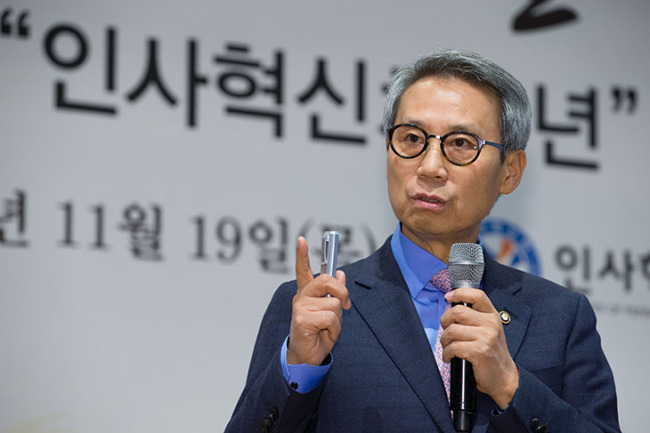 |
| Lee Geun-myeon, minister of personnel management. |
The work performance evaluation of high-ranking public servants will be tightened, possibly even leading to their dismissal, officials said Tuesday.
The Ministry of Personnel Management said starting next year the evaluation criteria and penalties will be strengthened to raise the work efficiency of civil servants who had thus far enjoyed great job security.
The move came after public pressure to enhance the “superficial” performance evaluation.
Under the existing system introduced in 2006, high-ranking public servants are evaluated into five grades. Those receiving the lowest grade more than twice are supposed to be reviewed for dismissal.
In reality, however, no underperforming officials were kicked out in the past decade, as they received the second-lowest grade at worst.
To strictly evaluate underperforming officials, the ministry said it would come up with specific guidelines on evaluating those with low grades.
Starting from next year, the lowest mark will be given to those who fail to implement scheduled policies, waste a large amount of their budget, show poor attitude or engage in corruption, such as receiving illegal favors or funds. When deemed unfit, the official in question will be removed from the post for a certain period of time before being reevaluated for final dismissal.
The ministry said it will also toughen the qualification criteria for high-ranking officials. Only Grade-III civil servants with over two years of experience at their post will be eligible for promotion. Currently, no minimum period had been set.
Grade-IV public servants with over five years or Grade-III officials with less than two years at their post will be considered for high-ranking positions as exceptional cases if their work performance is outstanding or their overall office term exceeds 20 years, they added.
The measures, although welcomed as a step forward to improving the work efficiency at public organizations, were also questioned over their efficacy.
“The effect of the new rule will depend on the will of ministers who actually hold the personnel authority over high-ranking officials. No matter how much the rule is tightened, the ministers are the ones who will finally reflect work performance in evaluations in the end,” public administration professor Lee Geun-joo at Ewha Womans University told The Korea Herald.
On Monday, the ministry also announced tougher punishments for corruption. Public servants who receive money, valuables or gifts exceeding 1 million won ($855) in value will either be expelled or removed from their posts.
If expelled, they would not be allowed to return to their post within the following five years. Public pension and retirement allowances would also be cut by half, officials said.
If removed from the position, they would not be eligible to be reappointed for three years, with their pension and retirement allowances cut by a quarter.
By Lee Hyun-jeong (rene@heraldcorp.com)

